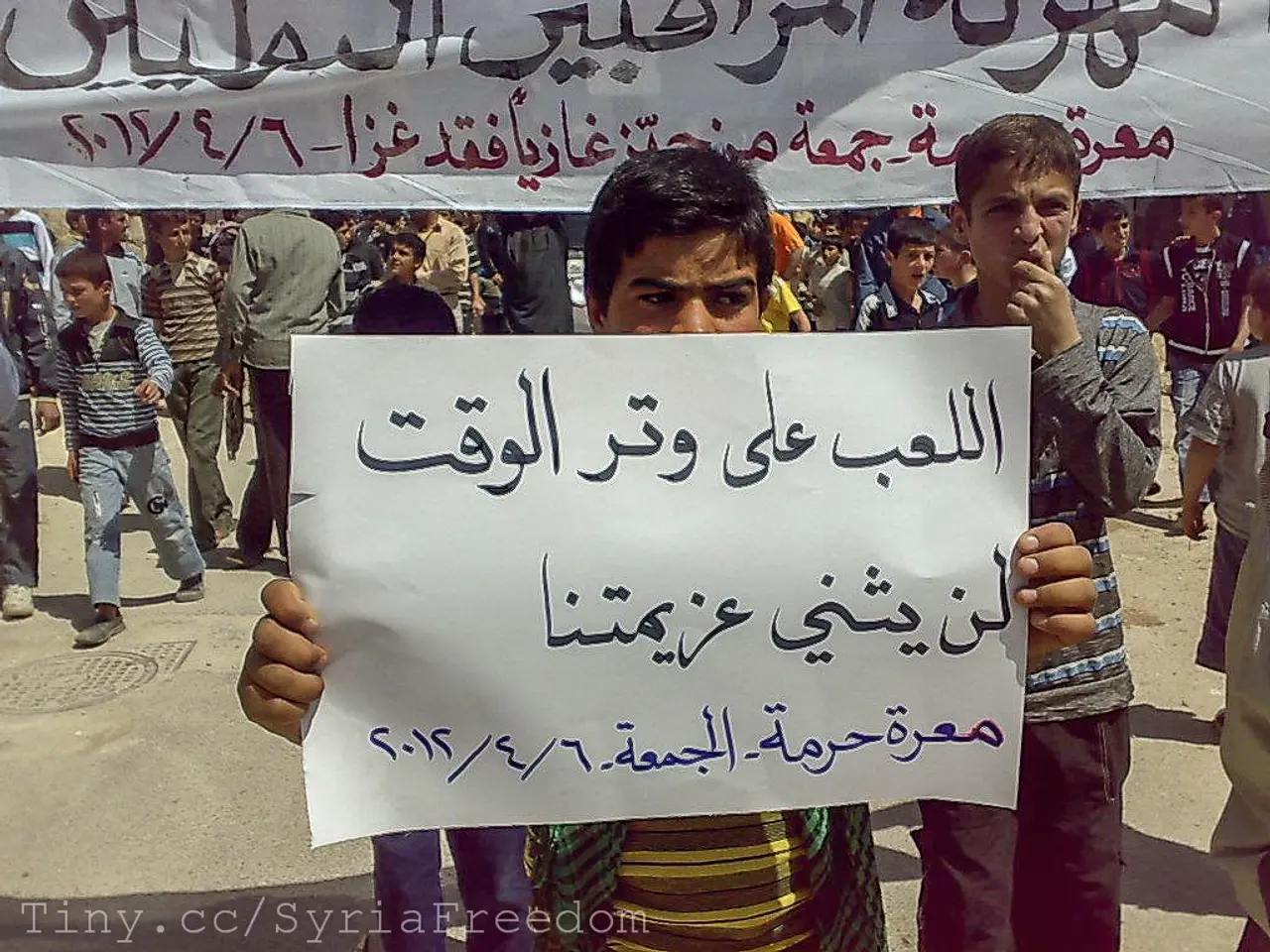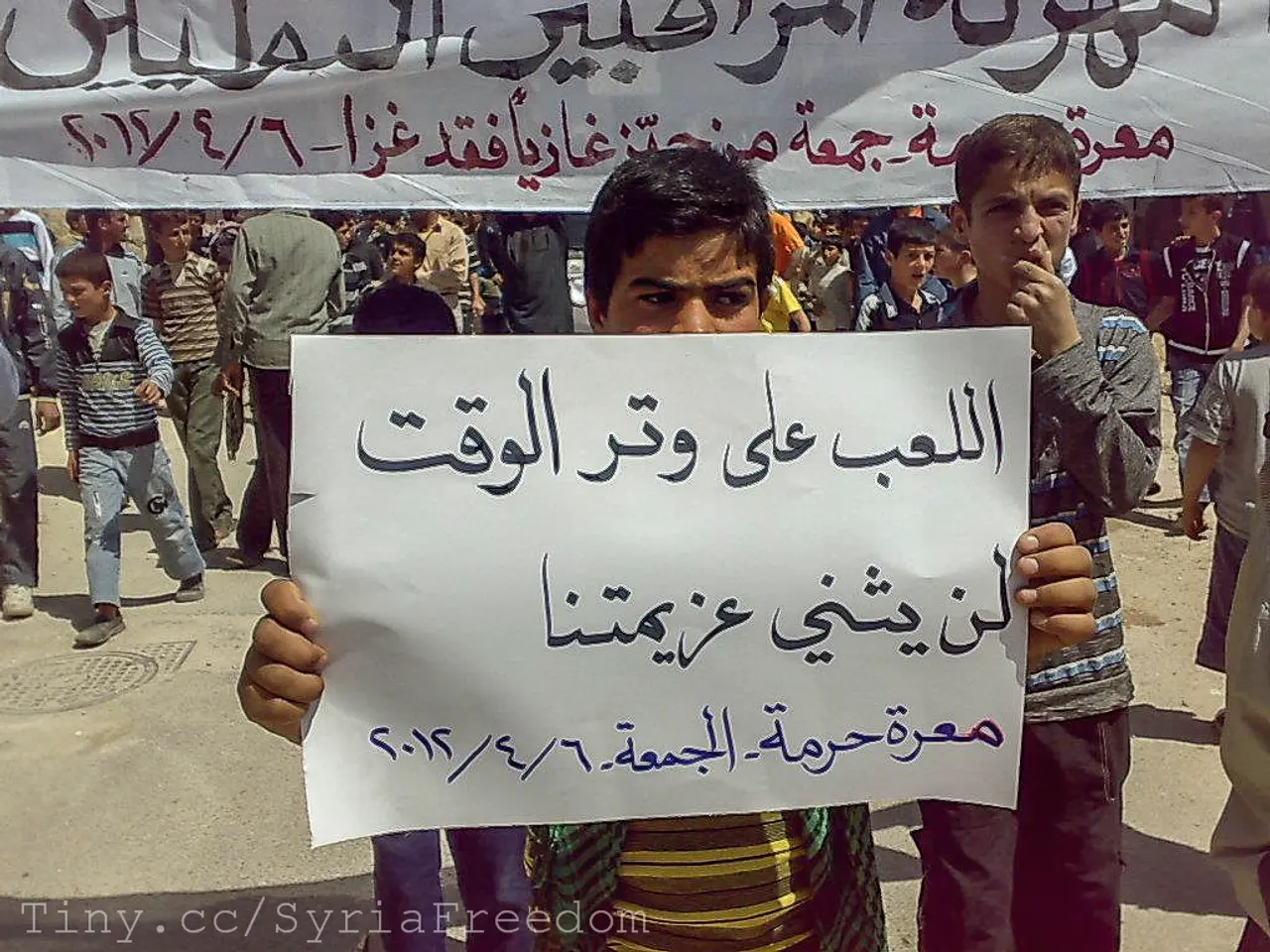Pro-Palestinian protest in Berlin results in injuries and multiple arrests by police
In the recent aftermath of the escalating Israel-Hamas conflict, Germany has adjusted its stance towards the Israeli-Palestinian conflict, emphasising the worsening humanitarian situation in Gaza and the urgent need for a negotiated two-state solution.
Germany, a long-standing supporter of Israel, now regards the recognition of a Palestinian state as "one of the final steps on the path to achieving a two-state solution." However, as the civilian toll and plight in Gaza have risen, Germany has sharpened its criticism of Israel.
The Israel-Hamas conflict, which began following Hamas's attack on October 7, 2023, has resulted in significant casualties. According to the Associated Press (AFP), the Hamas attack led to the deaths of 1,219 people, most of them civilians. The Israeli campaign, in turn, has reportedly killed 59,733 Palestinians, mostly civilians, according to the health ministry in the Hamas-run territory.
Germany maintains a firm commitment to Israel's right to exist and defend itself, but has shifted its tone, advocating for increased humanitarian aid access to Gaza and diplomatic engagement rather than sanctions on Israel. Germany opposes premature recognition of a Palestinian state or punitive measures against Israel but insists that Israel take immediate actions to alleviate Gaza’s suffering and avoid policies that could lead to further isolation internationally.
Germany's human rights commissioner, Lars Castellucci, has highlighted that Germany rejects sanctions on Israel despite criticising Israel's military actions causing civilian casualties, reflecting Germany’s historic responsibility towards Israel. Foreign Minister Johann Wadephul has emphasised Germany's continued support for Israel's security, demanding Hamas’s disarmament and the release of hostages, including Germans. Wadephul also expressed concern over Gaza’s humanitarian crisis, stressing the importance of a durable two-state solution as the ultimate resolution, though recognition of a Palestinian state remains a long-term goal to be reached at the end of negotiations.
Chancellor Scholz and the Federal Government have reaffirmed their stance that Israel must defend itself against “barbaric” attacks and that peace can only be achieved through negotiations yielding a viable Palestinian state alongside Israel. Germany continues to provide support to the Palestinian Authority and recognizes the need for Gaza’s reconstruction and administration once a lasting ceasefire is established. The government seeks diplomatic efforts to encourage Israeli policy changes to improve Gaza’s conditions while preventing escalation and isolation of Israel internationally.
Amidst these developments, pro-Palestinian protests have been occurring frequently in Germany and other parts of Europe. On Saturday, approximately 10,000 demonstrators participated in a pro-Palestinian rally in Berlin. However, the event was marred by public order disturbances, leading to arrests for resisting police, throwing bottles, physical altercations, using anti-Semitic slogans, and displaying symbols of anti-constitutional and terrorist organizations. It's important to note that discussing with the police in Germany may require specific knowledge or guidelines, as per the article "What to know about talking to the police in Germany."
A demonstration by far-right militants opposed to the Pride march also took place, resulting in 20 arrests. The rally was organized by the "Internationalist Queer Pride for Liberation" movement.
In summary, Germany balances steadfast support for Israel’s security with concern about Gaza's humanitarian crisis, opposing sanctions but calling for constructive diplomatic engagement aimed at a negotiated peace and two-state solution. Recent demonstrations or broader public opinion shifts have not caused Germany to deviate from this nuanced position.
Politics surrounding the Israel-Hamas conflict have extended beyond general-news, as the humanitarian situation in Gaza is now a key topic of conversation in the realm of crime-and-justice. In light of the worsening conditions in Gaza, Germany's foreign minister, Johann Wadephul, has expressed concern over the humanitarian crisis and stressed the importance of a durable two-state solution.







